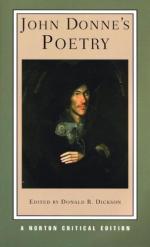|
This section contains 917 words (approx. 4 pages at 300 words per page) |

|
Uncertainty in John Donne Poetry
Summary: Describes how the feeling of uncertainty is depicted in much of John Donne's poetry. Describes how John Donne's poems discussing women and religion are among the most noticeable examples of the deliberate use of ambiguity in seventeenth-century poetry.
Poetry of the seventeenth century is among some of the best ever written, however, there is more uncertainty when dealing with particular subjects. The topics, for the most part, are more serious and there is the impression that the poets are earnestly uncertain about their choices. The poets themselves do not want to make any definite lines between what they believe and what could be the reality. John Donne's poems discussing women and religion are among the most noticeable examples of the deliberate use of ambiguity in seventeenth-century poetry.
It is evident by reading John Donne's poetry that he was a man of intense passion; even in his most light-hearted poems are the suggestions of resentment. In Donne's religious poems from "Holy Sonnets" there is still a sense of ambiguity and hesitance. In the poem which begins "Thou hast made me" the speaker is aware of his sins...
|
This section contains 917 words (approx. 4 pages at 300 words per page) |

|


